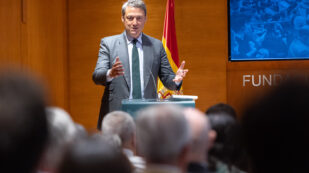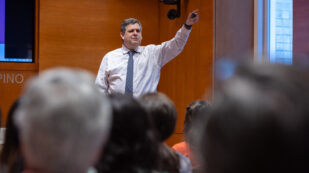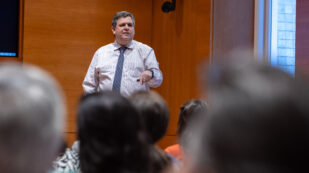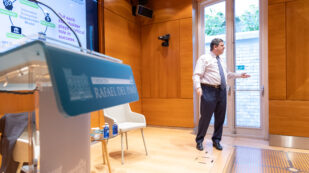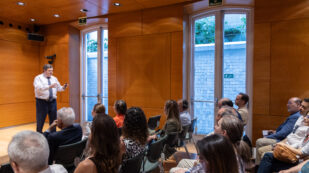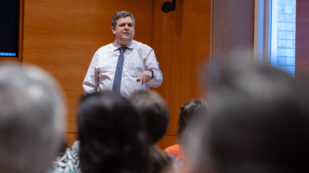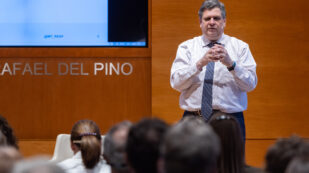Scott Stern and Mercedes Delgado
Summary:
On 29 May, the Rafael del Pino Foundation organised the Keynote Lecture "Frontiers of entrepreneurship and innovation".The event, which was followed by a talk by Scott Stern, professor at the MIT Sloan School of Management and a leading international figure in the strategic analysis of innovation, commemorated the tenth anniversary of the programme. The event, followed by a colloquium with Mercedes Delgado, professor at Copenhagen Business School, commemorated the tenth anniversary of the programme. Frontiers of Entrepreneurship and InnovationThe project is the result of a collaboration between the Foundation and MIT.
Strategy as a driver of entrepreneurship
Stern focused his intervention on how to transform ideas into impact through an appropriate strategy. In an environment of high uncertainty, early strategic decisions become decisive elements for the growth and sustainability of new business projects.
The analysis of cases such as Kendall Square in Boston, which has been converted into a global innovation centre, served to illustrate how local ecosystems, when they are dynamic and open, favour the emergence of innovative companies capable of scaling up quickly. Stern stressed that the key to success does not lie in the action of a single agent, but in the effective interaction between universities, companies, governments and venture capital, with entrepreneurs as essential protagonists.
A model for decision-making
During his presentation, the professor presented the principles of Entrepreneurship: Choice and StrategyThe work, which proposes the Entrepreneurial Strategy Compass as a tool to guide entrepreneurs in their first strategic decisions. This model makes it possible to visualise the development options between collaboration or competition with consolidated companies and between control or rapid execution of innovation.
The approach breaks with the traditional idea of a single path to success. Good ideas often allow for different routes to commercialisation and expansion. Stern therefore stresses the need to implement systematic experimentation processes to validate business hypotheses before committing resources on a large scale.
The role of ecosystems and public policy
A central aspect of the conference was the reflection on the role of innovation ecosystems. Stern stressed that their strength does not depend on a single leadership, but on a network of actors interacting in a coordinated way, reducing frictions and facilitating access to strategic resources such as talent, knowledge and funding.
In the subsequent colloquium, Mercedes Delgado addressed the need to promote more inclusive ecosystems, where diversity of gender and profiles in innovative entrepreneurship is encouraged. It was also stressed that governments should act as enablers of these ecosystems, establishing flexible regulatory frameworks, facilitating public-private collaboration and using innovative public procurement as a mechanism to support the scaling of startups.
A strategic opportunity for Spain
At a time of geopolitical tensions and transformation of global value chains, Spain and Europe have a strategic opportunity to consolidate their position in the knowledge economy. Taking advantage of regional competitive advantages, strengthening the entrepreneurial culture and facilitating the growth of innovative companies will be decisive factors in guaranteeing sustainable and competitive economic development in the new global scenario.
With initiatives such as this conference, the Rafael del Pino Foundation reaffirms its commitment to promoting leadership, innovation and entrepreneurship as essential drivers of economic and social progress in Spain.
The Rafael del Pino Foundation is not responsible for the comments, opinions or statements made by the people who participate in its activities and which are expressed as a result of their inalienable right to freedom of expression and under their sole responsibility. The contents included in the summary of this conference are the result of the debates held at the meeting held for this purpose at the Foundation and are the responsibility of their authors.
The Rafael del Pino Foundation is not responsible for any comments, opinions or statements made by third parties. In this respect, the FRP is not obliged to monitor the views expressed by such third parties who participate in its activities and which are expressed as a result of their inalienable right to freedom of expression and under their own responsibility. The contents included in the summary of this conference are the result of the discussions that took place during the conference organised for this purpose at the Foundation and are the sole responsibility of its authors.
